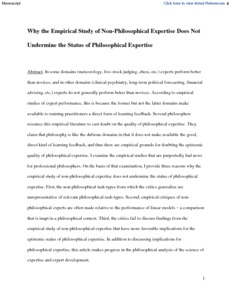Bach, Theodore
(2019)
Why the Empirical Study of Non-Philosophical Expertise Does Not Undermine the Status of Philosophical Expertise.
Erkenntnis, 86 (4).
pp. 999-1023.
![[img]](https://philsci-archive.pitt.edu/20058/1.hassmallThumbnailVersion/Bach%2C%20Why%20the%20empirical%20study%20of%20non-philosophical%20expertise%20does%20not%20undermine%20the%20status%20of%20philosophical%20expertise%20%282%29.pdf)  Preview |
|
Text
Bach, Why the empirical study of non-philosophical expertise does not undermine the status of philosophical expertise (2).pdf
Download (615kB)
| Preview
|
Abstract
In some domains (meteorology, live-stock judging, chess, etc.) experts perform better than novices, and in other domains (clinical psychiatry, long-term political forecasting, financial advising, etc.) experts do not generally perform better than novices. According to empirical studies of expert performance, this is because the former but not the latter domains make available to training practitioners a direct form of learning feedback. Several philosophers resource this empirical literature to cast doubt on the quality of philosophical expertise. They claim that philosophy is like the dubious domains in that it does not make available the good, direct kind of learning feedback, and thus there are empirical grounds for doubting the epistemic quality of philosophical expertise. I examine the empirical studies that are purportedly bad news for professional philosophers. On the basis of that examination, I provide three reasons why the empirical study of non-philosophical expertise does not undermine the status of philosophical expertise. First, the non-philosophical task-types from which the critics generalize are unrepresentative of relevant philosophical task-types. Second, empirical critiques of non-philosophical experts are often made relative to the performance of linear models – a comparison
that is inapt in a philosophical context. Third, the critics fail to discuss findings from the empirical study of non-philosophical expertise that have more favorable implications for the epistemic status of philosophical expertise. In addition to discussing implications for philosophical expertise, this article makes progress in the philosophical analysis of the science of expertise and expert development.
Monthly Views for the past 3 years
Monthly Downloads for the past 3 years
Plum Analytics
Altmetric.com
Actions (login required)
 |
View Item |



